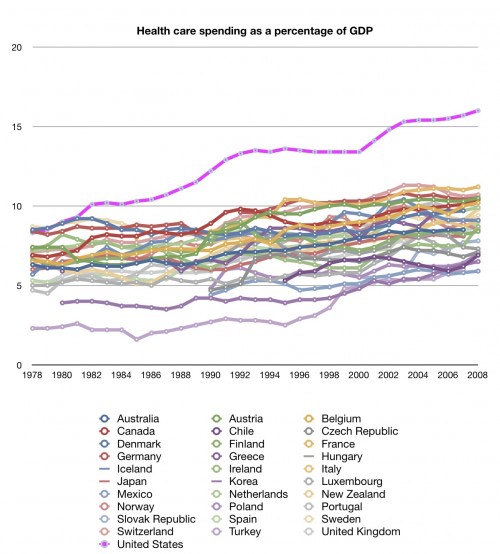October 11th, 2010 by Shadowfax in Better Health Network, Health Policy, Opinion, Research
No Comments »

Aaron Carroll over at The Incidental Economist has been running an excellent series on healthcare spending in the U.S. and how much more we spend than the rest of the world on a per capita basis, as a percentage of GDP, and by category. It’s an excellent series and I wholly recommend it. Summary graph:

Hint: the U.S. is the lavender-ish line on top. As he says, is there anything about this graph that isn’t concerning? Read more »
*This blog post was originally published at Movin' Meat*
October 5th, 2010 by KevinMD in Better Health Network, Health Policy, News, Opinion
No Comments »

Peter Orszag wants doctors to work weekends. The former director of the White House Office of Management and Budget wrote as much in this past weekend’s New York Times:
Doctors, like most people, don’t love to work weekends, and they probably don’t enjoy being evaluated against their peers. But their industry can no longer afford to protect them from the inevitable. Imagine a drugstore open only five days a week, or a television network that didn’t measure its ratings. Improving the quality of health care and reducing its cost will require that doctors make many changes — but working weekends and consenting to quality management are two clear ones.
And he’s right, to a point.
I’ve pointed to studies showing that mortality rises on the weekends, in part due to skeleton staffs that hospitals employ on Saturday and Sunday. And, since Mr. Orszag is an economist, the cost factor is noted. Tests that get pushed off until Monday cost the health system serious dollars. The problem I have is that Mr. Orszag, like most health reformers, offers doctors little incentive in return. Read more »
*This blog post was originally published at KevinMD.com*
October 4th, 2010 by DavidHarlow in Better Health Network, Health Policy, News, Opinion
No Comments »

Federal health reform and Massachusetts health reform may find a point of convergence in the development of ACOs (accountable care organizations) and the payment mechanisms that will make them tick (or hum, or do whatever it is that we want them to do). The Federales will be holding a listening session next week on the issues raised by ACOs across the HHS and FTC landscapes. Meanwhile, back in Boston, the inner circle of health care regulators and the regulated community are busy hashing out an approach to global payments that could be ready for prime time by January 1.
The need for payment reform in Massachusetts has been well-documented — see the health care market report from the AG’s office, as well as an earlier report on the imperative to keep insurance risk on insurers and place performance, or quality, risk on providers. Now, this may be easier said than done, but we’ve got some of the best and brightest working away at the issue.
Unfortunately, the Massachusetts legislature blinked, and has not mandated the approach across the board — at least not yet. Initially, the global, or bundled, payment for episodes of health care approach is being tentatively applied to just a couple of types of episodes of care. (See Section 64 of Chapter 288 of the Acts of 2010 – the small group market reform legislation enacted this summer.) Read more »
*This blog post was originally published at HealthBlawg :: David Harlow's Health Care Law Blog*
October 3rd, 2010 by DrRob in Better Health Network, Health Policy, Opinion
1 Comment »

“It will never happen.”
“They know better than to do it.”
“They realize the disaster it would be if they let it pass.”
That’s what I hear. I hear that the upcoming SGR adjustment, the one that will cut Medicare reimbursement by 23 percent, won’t go through.
In case you missed it, the SGR is a formula coming from the Balanced Budget Act of 1997 that does automatic cuts to Medicare reimbursement. This year we witnessed a legislative game of chicken in congress, with both sides agreeing that it was a bad idea to screw physicians in a time that they are trying to fix healthcare. Read more »
*This blog post was originally published at Musings of a Distractible Mind*
October 3rd, 2010 by DrRich in Better Health Network, Health Policy, Opinion, Research
No Comments »

DrRich has said many times that clinical science is among the least exact of the sciences, and therefore, the results of clinical research are particularly susceptible to “spinning” by various interested parties, in order to yield the kind of results they would prefer to see.
Until recent times in American medicine, the parties who have been most interested in spinning clinical research have been the people who run drug companies and medical device companies (who need clinical research which supports the use of their products), and the medical specialists (who are more likely to be paid for performing medical procedures that are supported by clinical research). In writing about such data-spinning abuses, DrRich has particularly targeted his own Cardiology Guild, but only because he knows and loves cardiologists the best. He suspects that other specialists are doing exactly the same thing.
While DrRich has used reasonably gentle humor (laced, to be sure, with sarcasm and irony) to criticize doctors and their industry collaborators for twisting clinical data to their own ends, others have expressed the same concerns in much more indignant terms, and have threatened to employ professional sanctions, civil and criminal penalties, and everlasting perdition, to curtail such behaviors. Read more »
*This blog post was originally published at The Covert Rationing Blog*
















